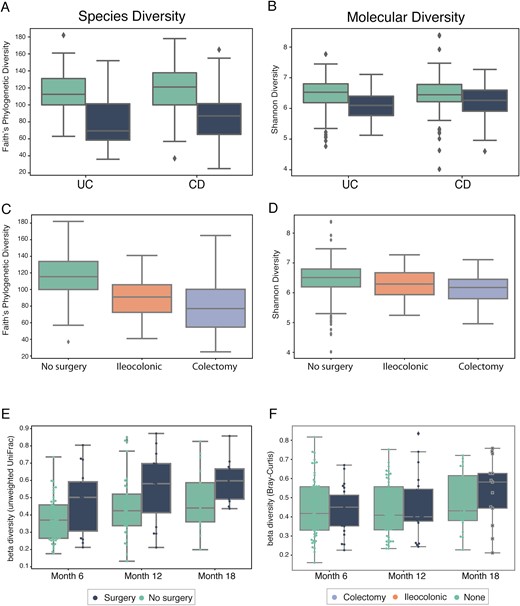Gastrointestinal Surgery for Inflammatory Bowel Disease Persistently Lowers Microbiome and Metabolome Diversity
Inflammatory Bowel Diseases, izaa262, https://doi.org/10.1093/ibd/izaa262
Published:
07 October 2020
Abstract
Background
Many studies have investigated the role of the microbiome in inflammatory bowel disease (IBD), but few have focused on surgery specifically or its consequences on the metabolome that may differ by surgery type and require longitudinal sampling. Our objective was to characterize and contrast microbiome and metabolome changes after different surgeries for IBD, including ileocolonic resection and colectomy.
Methods
The UC San Diego IBD Biobank was used to prospectively collect 332 stool samples from 129 subjects (50 ulcerative colitis; 79 Crohn’s disease). Of these, 21 with Crohn’s disease had ileocolonic resections, and 17 had colectomies. We used shotgun metagenomics and untargeted liquid chromatography followed by tandem mass spectrometry metabolomics to characterize the microbiomes and metabolomes of these patients up to 24 months after the initial sampling.
Results
The species diversity and metabolite diversity both differed significantly among groups (species diversity: Mann-Whitney U test P value = 7.8e-17; metabolomics, P-value = 0.0043). Escherichia coli in particular expanded dramatically in relative abundance in subjects undergoing surgery. The species profile was better able to classify subjects according to surgery status than the metabolite profile (average precision 0.80 vs 0.68).
Conclusions
Intestinal surgeries seem to reduce the diversity of the gut microbiome and metabolome in IBD patients, and these changes may persist. Surgery also further destabilizes the microbiome (but not the metabolome) over time, even relative to the previously established instability in the microbiome of IBD patients. These long-term effects and their consequences for health outcomes need to be studied in prospective longitudinal trials linked to microbiome-involved phenotypes.

 academic.oup.com
academic.oup.com
Inflammatory Bowel Diseases, izaa262, https://doi.org/10.1093/ibd/izaa262
Published:
07 October 2020
Abstract
Background
Many studies have investigated the role of the microbiome in inflammatory bowel disease (IBD), but few have focused on surgery specifically or its consequences on the metabolome that may differ by surgery type and require longitudinal sampling. Our objective was to characterize and contrast microbiome and metabolome changes after different surgeries for IBD, including ileocolonic resection and colectomy.
Methods
The UC San Diego IBD Biobank was used to prospectively collect 332 stool samples from 129 subjects (50 ulcerative colitis; 79 Crohn’s disease). Of these, 21 with Crohn’s disease had ileocolonic resections, and 17 had colectomies. We used shotgun metagenomics and untargeted liquid chromatography followed by tandem mass spectrometry metabolomics to characterize the microbiomes and metabolomes of these patients up to 24 months after the initial sampling.
Results
The species diversity and metabolite diversity both differed significantly among groups (species diversity: Mann-Whitney U test P value = 7.8e-17; metabolomics, P-value = 0.0043). Escherichia coli in particular expanded dramatically in relative abundance in subjects undergoing surgery. The species profile was better able to classify subjects according to surgery status than the metabolite profile (average precision 0.80 vs 0.68).
Conclusions
Intestinal surgeries seem to reduce the diversity of the gut microbiome and metabolome in IBD patients, and these changes may persist. Surgery also further destabilizes the microbiome (but not the metabolome) over time, even relative to the previously established instability in the microbiome of IBD patients. These long-term effects and their consequences for health outcomes need to be studied in prospective longitudinal trials linked to microbiome-involved phenotypes.

Gastrointestinal Surgery for Inflammatory Bowel Disease Persistently Lowers Microbiome and Metabolome Diversity
AbstractBackground. Many studies have investigated the role of the microbiome in inflammatory bowel disease (IBD), but few have focused on surgery specifically
